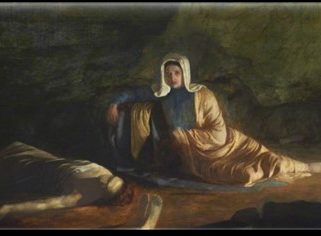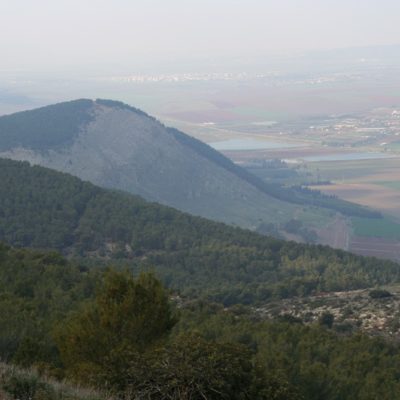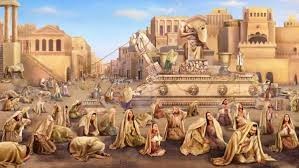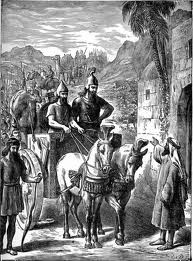Rizpah a Concubine of Saul

Rizpah is found in the book of 2 Samuel. Rizpah, the daughter of Aiah and the concubine of King Saul, once King Saul dies, King David hands over seven of his relatives to be executed by the Gibeonites. The bodies of the seven were left to be eaten by the wild animals. Rizpah risked her life to bury her two sons. She adorned sackcloth and spent the days and nights chasing away the birds and wild animals away from her dead son’s bodies and the others with them. She showed great heroism, courage and love.
2 Samuel 21:8–13
The beginning of the account of Rizpah, the daughter of Aiah and the concubine of King Saul, begins with the two sons she bore to King Saul Armoni and Mephibosheth. It was during a time where there was war between the house of Saul and the house of David. Abner, Saul’s cousin and army captain, gave his allegiance to the house of Saul.
Ishbosheth was a surviving son of Saul, king of Israel for seven years while David was king over Judah; succeeded by David who united the kingdom. (Strong, 2001. #0378). Ishbosheth accused Abner of going into the concubine of Soul. Ishbosheth implied the purpose on the part of Abner was to declare his intention of seizing the throne. Abner was extremely angry and offended because of what Ishbosheth had said. Because of the accusation Abner said he would going over to the side of David, whom he now professed to regard as anointed by the Lord to reign over all Israel. David received him favorably. Ishbosheth could not answer Abner again, because he feared him. (2 Samuel 3:6–11).
Then there was a famine in the days of David three years, year after year; and David enquired of the LORD. And the LORD answered that it was for Saul, and for his bloody house, because Saul slew the Gibeonites. The Gibeonites were not of the children of Israel, but of the remnant of the Amorites; and the children of Israel had taken and agreement with them: and Saul sought to slay them in his zeal or jealous to the children of Israel and Judah. The Gibeonites had deceived Joshua into making a treaty with them. They had remained in the land ever since, protected by this ancient treaty, they were basically slaves of the Israelites. Saul apparently decided to wipe them out. This campaign against the Gibeonites was a deliberate violation of the ancient treaty sworn to in the name of the Lord by Joshua, the LORD God was angered. (Joshua 9:1-15).
King David ask the Gibeonites what he could do to make atonement they may bless the inheritance of the LORD. The Gibeonites said unto David, We will have no silver nor gold of Saul, nor of his house; neither for us shall you kill any man in Israel. The punishment was to be seven men of Saul to be delivered unto the Gibeonites, they would hang them up unto the LORD in Gibeah of Saul, whom the LORD did choose. King David said, I will give them. King David spared Mephibosheth, the son of Jonathan the son of Saul, because of the LORD’S oath that was between them, between David and Jonathan the son of Saul. (2 Samuel 21: 1-7).
The king took Armoni and Mephibosheth, the two sons of Aiah’s daughter Rizpah, whom she had borne to Saul, together with the five sons of Saul’s daughter Merab, whom she had borne to Adriel son of Barzillai the Meholathite. He handed them over to the Gibeonites, who killed and exposed them on a hill before the LORD. All seven of them fell together; they were put to death during the first days of the harvest, just as the barley harvest was beginning. (2 Samuel 21:8–9).
Rizpah took sackcloth, and spread it for her upon the rock, from the beginning of harvest until water dropped upon them out of heaven, and suffered neither the birds of the air to rest on them by day, nor the beasts of the field by night. This was told to King David that the concubine of Saul had done this. And David took the bones of Saul and the bones of Jonathan his son from the men of Jabeshgilead, which had stolen them from the street of Bethshan, where the Philistines had hanged them, when the Philistines had slain Saul in Gilboa: and he brought up from there the bones of Saul and the bones of Jonathan his son; and they gathered the bones of them that were hanged and buried them in the country of Benjamin in Zelah, in the sepulcher of Kish his father: and they performed all that the king commanded. And after that God was entreat or prayed for the land. (2 Samuel 21:10–14).
Throughout ancient history concubines were considered part of the spoils of war. When the conquer claims the wife or concubines of the previous king as his own it could guarantee him the throne. Also, if a son of the king were to sleep with his father’s concubine this would signified a political act, and suggests the son was claiming the throne. Ishbosheth was accusing Abner of trying to claim the throne by attempting to sleep with Rizpah, and Rizpah understood that this allegation would mean.
Rizpah did not affect legal power over the throne as the concubine, even though she did have the advantages of the throne. Concubines would also go with whoever was on the throne. Concubines also could be factored into the negotiating of treaties. If Ishbosheth saw it fit he could give Rizpah to Abner just for the asking. It this arrangement would have been arranged Rizpah would have had protection, food, shelter and prestige.
Rizpah went from living a good life being the concubine of the king with two sons to being a widow, and childless. There was some prestige associated at being the concubine of Saul. The prestige would have ended after the death of Saul. When Ishbosheth, the son of Saul who took over the kingdom as the King, he accused Abner, the military commander and the man who helped him become King, of violating Rizpah. Then she lost both of her sons. Rizpah lost here social prestige, her reputation, her sons, and her livelihood. She endured all this and then went out into the fields where her sons and the five sons of Merab. Rizpah was determined to guard the bodies of her sons. She spread sackcloth, which is a symbolic representation of overwhelming grief. This was not just for a day or two she kept her vigil over her son’s bodies for five months, from harvest to the rain. She endured the heat of the day, and the cold of the night. She had to always stay vigilant. It is hard to say where she got her food and when she slept yet she endured.
When David was told of what Rizpah was doing, he was deeply moved. Rizpah gained the respect of King David. It was because of the sacrifice of the seven deaths, and two of them were Rizpah only sons, that the Gibeonites demands had been appeased and the famine in Israel had ended.
Rizpah can be said to have advanced the purpose and will of the LORD God. She showed more integrity, courage and endurance than that of Ishbosheth, Abner, or even King David. She is an inspiration to all Christian women who have to endure the unfairness of life, whatever that may be. Rizpah what she believed to be the right thing to do, to ensure her two sons and the five sons of Merab would have a proper burial. It was the sacrifice of Rizpah and Merab in losing their sons that insured the famine in Israel ended.
Reference:
Strong, James. (2001).The New Strong’s Expanded Exhaustive Concordance of the Bible. Nashville: Thomas Nelson Publishers.
Cite Article Source
MLA Style Citation:
Holstein, Joanne “Rizpah a Concubine of Saul: .” Becker Bible Studies Library Feb 2015.< https://guidedbiblestudies.com/?p=2292,>.
APA Style Citation:
Holstein, Joanne (2015, February) “Rizpah a Concubine of Saul: .” Becker Bible Studies Library. Retrieved from https://guidedbiblestudies.com/?p=2292,.
Chicago Style Citation:
Holstein, Joanne (2015) “Rizpah a Concubine of Saul: .” Becker Bible Studies Library (February), https://guidedbiblestudies.com/?p=2292, (accessed).


